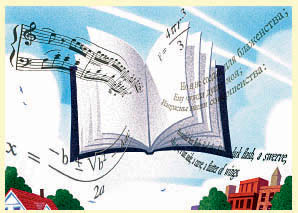Your Page
Last spring, I spoke at the Honors Banquet, the annual student-faculty gathering where seniors and professors celebrate the conclusion of their honors thesis collaborations.

As mine was a one-year appointment to the chemistry faculty, I advised none of the seniors’ theses. I’m just two years out of grad school, so my own academic publication record can fit on a Post-it, and I was more likely to be identified as a member of the sophomore class than as a Bates professor during my year back on campus.
So I couldn’t offer the seniors much scholarly advice, but I could speak from experience. And what I remember is feeling petrified by the one question that wouldn’t go away, despite just having climbed Bates’ highest academic mountain:
What do I do now?
My answer to that question that evening came from chemistry. (True, I tend to draw parallels between my field and real life: At dinner, I couldn’t help but notice that the centerpieces looked like molecules.)
Specifically, my advice came from the Second Law of Thermodynamics, which talks about the ever-increasing entropy, or disorder, of the universe.
When you open your dorm window in January and heat escapes into the cold Lewiston air, that’s entropy. When hot, energetic food molecules burst from the Commons kitchen and collide with your clothes, remaining there hours later, that’s entropy (at Bates, it’s also called “the Commons smell”).
Some see a doomsday scenario in this law, predicting that the inexorable spread of energy can only end with the universe dying a cold death, all its energy extended and disordered.
Or, as I suggested to the seniors, we can regard the Second Law as a helpful guide in life, as encouragement to be generous with our knowledge and ideas.
Once finished, a copy of every honors thesis heads to the Bates library, where it sits, its spine unflexed. Mine is there, and I don’t know anyone, except my thesis adviser, Rachel Austin, who has read it (the title is “Catalytic and Mechanistic Investigations into Organic Hydroxylations Mediated by MCM-41 Encapsulated Metalloporphyrins,” in case you want to look it up.) The copy I gave my parents sits on a coffee table under their TV Guide. No matter how diligently prepared, no matter how many hours it symbolizes, the thesis is just a book at the lowest rung of any must-read list.
The knowledge within all those black-bound pages stays there unless the authors broadcast it outward with all the excitement that drew them to the topic in the first place. As a teacher, that is my goal. But embracing entropy should be the goal of any thesis senior — or any Bates senior, period — who shifts from the thesis mindset of “I, me, mine” to one of “you, us, ours.” Show the world why Mozart is a virtuoso; tell others the thrill of reading the poetry of Pushkin. If you don’t, or don’t even try, you are like books in a library locked to the public.
If we follow the Second Law and let knowledge flow outward, our random contacts with others could ignite sparks of interest. Sharing your delight in classical music or Russian poetry could add new links to a chain of excitement that started with Mozart or Pushkin and continues to grow today thanks to educated Bates grads. In this sense, it’s not surprising that Vaclav Havel defines life as the reduction of entropy.
Spreading the word — in this entropic sense — means being willing to connect with people you meet by chance, not bounding away like an energized atom, as I nearly did one day last year.
I was walking my dog down Main Street and over the bridge into Auburn. As I crossed the Androscoggin, an older man in a mobility scooter wheeled up alongside. I didn’t make eye contact, but my dog did, and a few wags of my dog’s tail later the man and I were in a conversation. I enjoyed that crossing infinitely more than had I crossed in silence. Perhaps he did, too.